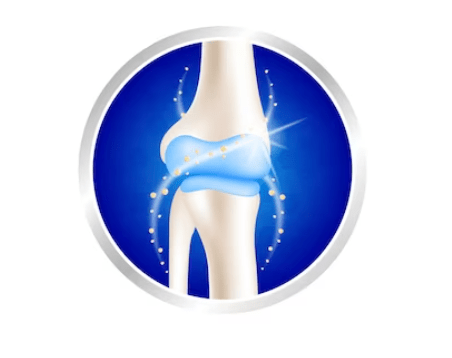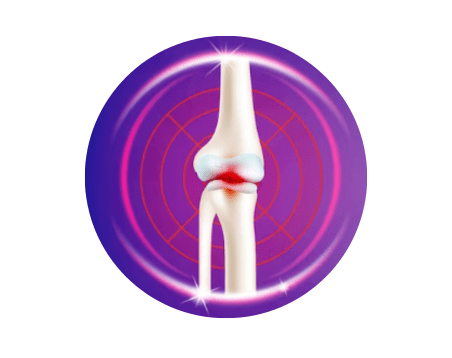Dr. Murtaza Adeeb is one of the best Knee Replacement Surgeon in Pune. With extensive expertise in Robotic knee surgery. If you are dealing with joint issues and looking for a Knee Replacement Surgeon in Pune, you can totally rely on Dr. Murtaza Adeeb
Dr. Murtaza Adeeb - Knee Replacement Surgeon in Pune Maharashtra

Understanding the Knee Joint
A. Healthy Knee
- The thigh bone (femur) and shinbone (tibia) come together to form the knee joint.
- The knee cap (patella) is the covering that protects the knee joint.
- The knee joint is lubricated by the synovial fluid made by the joint lining (synovium).
- Cartilage covers the ends of the knee bones and provides a cushion for the smooth and easy movement of the knee joint.
- The knee joint has a protective capsule with ligaments inside and outside, offering stability and strength.

B. Damaged Knee
Problems of the knee arise due to the deterioration of the cartilage. It may result in severe pain and you may not be able to walk. The cartilage may be damaged by
- Traumatic injury.
- High impact activity (may result in cartilage tearing off)
- Disease states like – Arthritis, osteoarthritis and rheumatoid arthritis.
- Genetic factors can also predispose a person to knee problems.

Knee Replacement Surgery Procedure
Total knee replacement is a surgical procedure by which a diseased knee joint is replaced with an artificial knee. Knee replacement surgery is usually performed under general anesthesia. The surgeon will make an incision over the knee and remove the damaged cartilage and bone. Metal and plastic components are then used to cap the ends of the bones that form the knee joint, along with the kneecap.
If you are considering knee replacement surgery in Pune, it’s advisable to consult with an experienced specialist like Dr. Murtaza Adeeb, a renowned knee replacement doctor in Pune at Advanced Bone care Clinic Wanawadi Road Fatimanagar, Pune.
Other Important Points To Remember
- You have to be physically healthy, so you should not have any fever, pain, etc.
- Tell your doctor about any medications you may be taking. Your doctor may ask you to stop taking medications that may interfere with your surgery.
- Tell your doctor about any treatment of significance, such as dental extractions or periodontal work, that you may be scheduled for, during the peri-operative period.
Total Knee Replacement Surgery Video Before and After Operation
Before Operation
After Operation
What is Osteoarthritis of Knee Joint Pain?
Degeneration of the underlying bone and joint cartilage (cushion). Arthritis is the most common cause of long-term knee pain and disability.
Common Causes of Knee Arthritis
- Osteoarthritis
- Rheumatoid arthritis
- Arthritis following injuries
Typically, osteoarthritis develops after the ages of 50 to 55. Wear and tear and softening of the cartilage occur. The rubbing of the bones against one another results in stiffness and pain in the knees. The illness known as rheumatoid arthritis causes the synovial membrane to thicken and inflame, damaging the cartilage and ultimately leading to pain, stiffness, and loss of cartilage. A serious knee injury, such as a fracture or severe tears to the knee ligaments, may be followed by post-traumatic arthritis.
Your Recovery in the Hospital After Knee Replacement Surgery
After knee replacement surgery, you will have to stay in the hospital for a few days. During your hospital stay you will be helped by your healthcare team on the road to recovery.
- You may experience some pain during the recovery period. If the pain after surgery is severe, talk to your doctor.
- Movement of the joint is important for its recovery. Walking will help you to recover. Light exercises should begin immediately after your surgery.
- It is advisable to breathe deeply and cough frequently to clear your lungs and avoid lung congestion after surgery.
- After surgery you will be given medicines called blood thinners that will prevent clots formation, this is important since clots in the blood vessels can be dangerous. Other measures to prevent blood clots and decrease leg swelling include DVT stockings.
- You will also be asked to exercise while sitting or lying on the bed. These exercises will help to restore knee and leg movements. Exercises decrease the leg swelling and improve your blood circulation while you are in bed.
Before you are discharged from the hospital, you will be helped to achieve
- Getting in and out of bed by yourself.
- Bending your knee approximately 90° or good progress in bending your knee.
- Straightening your knee, completely.
- Walking with crutches or a walker on a level surface and climbing up and down 2 or 3 stairs.
FAQ
What is knee replacement surgery?
Knee replacement surgery, also known as knee arthroplasty. It is a procedure where a damaged or worn-out knee joint is replaced with an artificial implant made of metal and plastic to reduce pain and improve mobility.
Who Needs Knee Replacement Surgery ?
knee replacement surgery typically has severe knee pain, limited mobility, and has not found relief from non-surgical treatments such as medications, physical therapy, or lifestyle modifications. A skilled specialist in knee replacement surgery, Dr. Murtaza Adeeb can examine and assist patients in need of knee replacements.
How long is the recovery period after knee replacement surgery?
The recovery period after knee replacement surgery varies for each individual, but generally, most people start feeling better within a few weeks. However, it might take several months to fully recover and regain strength in the knee. Physical therapy and rehabilitation exercises play a crucial role in the recovery process, helping to improve mobility and strength. Full recovery and return to normal activities can take around 3 to 6 months, but this timeline can vary based on factors like overall health, adherence to rehabilitation, and the specific surgical approach used.
Can I climb stairs after knee replacement Surgery ?
After knee replacement surgery, when you can start climbing stairs depends on the individual. Initially, patients are advised to take a few steps under supervision in the early weeks of recovery. As you heal, your physical therapist will help you slowly increase your stair activity. It’s important to follow your surgeon and therapist’s advice for a safe and effective recovery.
How soon can I start climbing stairs after total knee replacement surgery?
The timing for stair climbing after total knee replacement varies, but typically patients may start with simple stair activities under supervision during the initial weeks of recovery. Your surgeon and physical therapist will provide guidance based on your progress.
is climbing stairs good for knee replacement?
Yes, after knee replacement surgery, it’s usually a good idea to include stair climbing in your recovery routine. Just make sure to follow the advice of your Surgeon and take it gradually, adjusting the intensity based on how you are progressing in your recovery.
What precautions should be taken after knee replacement surgery ?
Right after knee replacement, make sure to do what your surgeon says. This might mean using special tools, taking your prescribed pain medicine, and being careful about certain movements. Following these dos and don’ts after knee replacement surgery helps you recover better.






